Welcome back to This Week in Apps, the weekly TechCrunch series that recaps the latest in mobile OS news, mobile applications and the overall app economy.
The app industry continues to grow, with a record 218 billion downloads and $143 billion in global consumer spend in 2020. Consumers last year also spent 3.5 trillion minutes using apps on Android devices alone. And in the U.S., app usage surged ahead of the time spent watching live TV. Currently, the average American watches 3.7 hours of live TV per day, but now spends four hours per day on their mobile devices.
Apps aren’t just a way to pass idle hours — they’re also a big business. In 2019, mobile-first companies had a combined $544 billion valuation, 6.5x higher than those without a mobile focus. In 2020, investors poured $73 billion in capital into mobile companies — a figure that’s up 27% year-over-year.
This Week in Apps offers a way to keep up with this fast-moving industry in one place, with the latest from the world of apps, including news, updates, startup fundings, mergers and acquisitions, and suggestions about new apps and games to try, too.
Do you want This Week in Apps in your inbox every Saturday? Sign up here: techcrunch.com/newsletters
Top StoriesApple Event wrap-upIt’s official, new iPhones are here. But everyone is talking about the iPad mini instead.
(Photo by Brooks Kraft/Apple Inc.)
Apple this week introduced its updated iPhone 13 lineup, which includes iPhone 13 in pretty new shades, an iPhone mini, and the more powerful iPhone 13 Pro and Pro Max. Consumers may care most about the battery life improvements — 1.5 hours longer on iPhone 13 mini and iPhone 13 Pro; 2.5 hours more on iPhone 13 and Pro Max, compared with their respective iPhone 12 models. Cameras got a decent upgrade, powered by the A15 Bionic, which enables additions like “Cinematic Mode” (a mode that allows you to change focus between subjects). Plus, Pro models can do macro photography and now include support for ProRes video recording at 1080p 30 fps with the 128GB storage option and up to 4K 30 fps with 256GB, 512GB and 1TB storage options. (Yes, there’s a 1TB iPhone now, and no more 64GB models. Hooray!)
Image Credits: Apple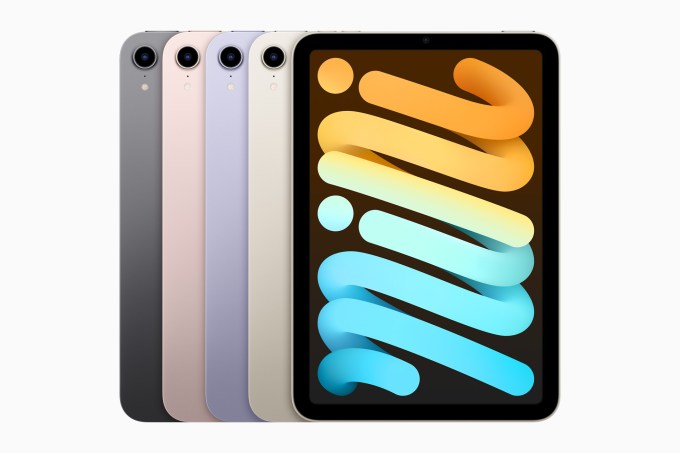
The bigger news in terms of hardware, however, was the iPad mini ($499+), aka the BIG iPhone, which got a significant update. The new device has an 8.3-inch display, front and rear-facing 12-megapixel cameras, 80% faster performance with the A15 Bionic, 40% faster CPU, support for 5G, and it adds a USB-C port and a relocated Touch ID that’s now on the top button. It also now supports Center Stage and Apple Pencil (2nd generation.) It’s also available in new finishes: space gray, pink, purple and starlight.
Apple noted there are more than 1 million apps designed specifically for iPad devices. The full App Store has 2.22 million or more, according to various estimates. A popular and affordable iPad mini could encourage more development beyond the iPhone.
Other announcements included a new standard iPad with spec bumps, a new Apple Watch Series 7 with a slightly bigger screen and fall detection for cyclists, an updated Fitness+ with Pilates and meditation, and a nifty MagSafe Wallet that will track the location where it was separated from your iPhone.
Apple sherlocks Watch keyboard appsImage Credits: FlickType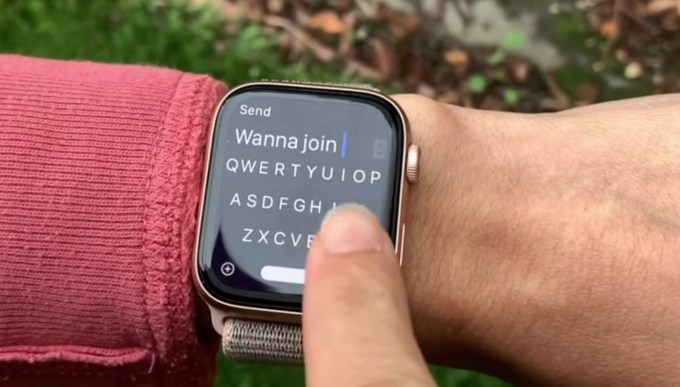
Frustrated iOS developer Kosta Eleftheriou, who is already engaging in a legal battle with Apple over money lost to App Store scams and other matters, couldn’t hold back his frustration when he saw Apple announce its new Apple Watch Series 7 would now sport a familiar-looking keyboard. Eleftheriou’s own FlickType keyboard app for Apple Watch was repeatedly rejected from the App Store for months on end, causing a lengthy delay in getting his app to market. The developer also claims to have had conversations with Apple execs about his keyboard app, which he says was once even considered an acquisition target.
Apple’s position on the matter is that it had to remove Eleftheriou’s app due to guidelines it had at the time prohibiting keyboard extensions, which the company had on the books due to what it believed would offer a poor consumer experience on earlier versions of Apple Watch, which had a smaller screen. These guidelines were later dropped once Apple learned of the app’s accessibility functions, which allowed the app to be published.
One question — which would have to either be worked out through the discovery process in court or through some sort of congressional investigation — is how long Apple had a Watch keyboard design on its product roadmap? Was Apple rejecting a third-party Watch keyboard app (and others like it, to be clear) over this purported “poor experience” at a time when Apple was actively designing its own keyboard UI? And how could there be a corporate firewall in place between App Store review activity and the company’s own plans, if Apple was considering an acquisition of FlickType at the time, as the lawsuit alleges?
Eleftheriou has a difficult path ahead of him going up against Apple’s legal team, but he’s more motivated than ever now. “See you in court, @Apple” he tweeted after the Watch reveal.
So now we know. See you in court, @Apple. https://t.co/hJtPI2Z83J pic.twitter.com/1s7MUSLTpc
— Kosta Eleftheriou (@keleftheriou) September 14, 2021
App Annie charged with securities fraud
The U.S. Securities and Exchange Commission (SEC) charged App Annie, as well as its co-founder and former CEO and Chairman Bertrand Schmitt, with securities fraud. App Annie and Schmitt have agreed to pay over $10 million to settle the fraud charges which are related to “deceptive practices and making material misrepresentations about how App Annie’s alternative data was derived,” the SEC said. The charges have to do with how App Annie used non-aggregated and non-anonymized data to alter its model-generated estimates to be more accurate, while telling trading firms that protections were in place against the misuse of confidential data. (More details and the full complaint can be read here on TechCrunch.)
In response to the bombshell news, one competitor has spoken up. Apptopia co-founder and CEO Jonathan Kay wrote about how his firm took the time to build the company and data estimates “the right way,” which is why some of its estimates in the past hadn’t been accurate. (It wasn’t cheating the system.) This proved to be the better strategy. “We did not take shortcuts to spur breakneck scale; oftentimes founders feel the pressure to do so to meet unrealistic Board, VC or Market expectations. We haven’t and we don’t,” he said.
Meanwhile, Appfigures shared a similar sentiment, adding they were disappointed to hear the news and hoped the actions didn’t erode trust in the industry. “Strict privacy has been one of our founding principles and has served our users and us well for 12 years. We believe the trust of our users is our most valuable asset,” their statement read.
Weekly NewsPlatforms: Apple- The Epic Games/Apple lawsuit will drag on. After last week’s ruling, which will now allow developers to add to iOS apps links to their website and other ways to pay, Epic said it would appeal. The Fortnite maker wanted Apple to be dubbed a monopolist, which would force iOS to be opened up to alternative app stores, like its own, or at least allow side-loading. But the judge said Apple’s success was “not illegal.”
- Developers were invited to submit their iOS 15, iPadOS 15, tvOS 15 and watchOS 8 apps to the App Store, ahead of the public launch on Monday.
- Apple introduced new marketing tools for app developers. Developers can now create custom marketing assets, including banners and images, to promote apps across social media and elsewhere. To get started, you select an app and a template, then customize the design and add present messages. The assets will be immediately available in the right sizes and can be shared with short links or codes that direct users to the App Store product page.
Image Credits: Apple
- A leaked document points toward an Android 12 release date of October 4th. The document informs OEM partners when to stop approving builds for prior versions of Android.
- Meanwhile, Samsung released an Android 12 beta to Galaxy S21 owners. The beta is for Samsung’s One UI 4, its version of Android, and arrives on September 14 — the same day Apple announced the iPhone 13.
- Google announced it would port a privacy-focused feature from Android 11 to older phones running Android 6 and higher. The feature automatically restricts apps’ permissions to sensitive phone features, like the storage or camera, if the app hasn’t been used for several months.
- Google delivered the first five stable Jetpack Wear OS libraries (wear, wear-input, wear-ongoing, wear-phone-interactions and wear-remote-interaction), to help developers build high-quality Wear OS apps. The company recently updated the Android Jetpack Wear OS libraries as well.
- Google invited users to join its Pixel Superfans group, which was previously kept under wraps. The pilot program provides insider access and a VIP experience, including access to a private Facebook Group, and perks like private Q&As and events, opportunities to share ideas with the Google team, limited-edition swag and more to come.
Image Credits: Snap
- Snapchat launched a new global portal Lens in partnership with Sotheby’s and the Estate of Christo. The Lens, “The Last Christo: Original Works for The Arc de Triomphe,” overlays Snap’s AR onto Christo’s work to give viewers an entirely new experience of the installation. The experience will also come to Snap’s main Camera and the Snap Map early next week.
MassMutual will have to pay a $4 million fine as part of a settlement with Massachusetts regulators involving the conduct of former employee Keith Gill, also an online trader who goes by “Roaring Kitty.” Gill was heavily involved with the GameStop meme-stock drama from earlier this year. The stock was a favorite with day traders on Reddit’s WallStreetBets message board. Trading app Robinhood had restricted the trading of this and other meme stocks, leading to a congressional investigation.
SocialImage Credits: Twitter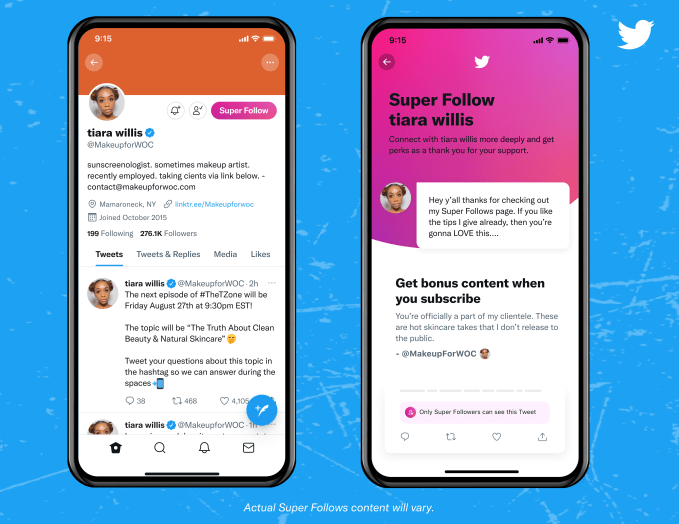
- Twitter Super Follows have only generated around $6,000 in the U.S. in the first two weeks the feature has been live across the U.S. and Canada. Canadian in-app revenue was around $600. Some small portion may be attributed to Ticketed Space, so true adoption figures may be even lower. Fewer than 100 creators in the U.S. have been offered access to Super Follows, which is impacting these figures. But all iOS users in these markets are able to subscribe to the participating creators.
- A Dept. of Homeland Security report warned law enforcement agencies that domestic extremists had used TikTok to recruit people to their causes and share tactical guidance in the lead up the January 6 attack on the U.S. Capitol.
- TikTok blocked content related to the “devious licks” viral challenge which was encouraging students to create havoc at schools by stealing things, including soap dispensers, hand sanitizer, COVID test kits, bathroom sinks and doors, classroom tech and more. As a result, schools across the U.S. have locked down access to bathroom facilities.
- A Facebook whistleblower has shared a damning set of internal docs with The Wall Street Journal, including how Instagram’s own internal research indicated how the app impacted teenage girls’ mental health over body image, leading them to have, in some cases higher rates of depression, anxiety and suicidal thoughts. Following the news, Senators Marsha Blackburn (R-TN) and Richard Blumenthal (D-CT) announced a probe into Facebook’s lack of transparency around its internal research.
- As news of Instagram’s impact on teens leaked, TikTok added more mental health resources of its own, including a “well-being guide” in its Safety Center, a primer on eating disorders, expanded search interventions and opt-in viewing screens on potentially triggering searches.
- LinkedIn announced a $25 million creator fund ahead of its plans to test a Clubhouse-style audio feature.
- Snap hired Jacqueline Beauchere, the chief online safety officer at Microsoft, to be its first-ever global head of platform safety. In her role, Beauchere will advise the company’s decisions on policies, guidelines, features and tools focused on safety and well-being.
- The beta version of the Signal for Android app expanded its privacy-focused crypto payments feature first introduced in April. The feature, MobileCoin, was previously only available in the U.K. It’s now offered in Switzerland, France and Germany. The app saw a few other design tweaks as well.
- WhatsApp launched the first test of a public directory for businesses within its app, starting in São Paulo, Brazil. The feature allows users to find shops and services through a directory in the app, which could then kick off their mobile commerce transactions.
- A report from The Financial Times (non-paywalled summary here) details how the Telegram app has exploded as a hub for cybercriminals who buy and sell stolen data and hacking tools. One channel featuring data dumps had more than 47,000 subscribers before being shut down.
- Emarketer reports the number of monthly messaging app users worldwide will rise 6.1%, to 3.09 billion, in 2021. This is a deceleration of growth from 2020, when the number grew nearly 14%, but an increase from a pre-pandemic estimate of 5.5% growth. By 2024, the firm predicts more than three-fourths of internet users will use a mobile messaging app.
Image Credits: eMarketer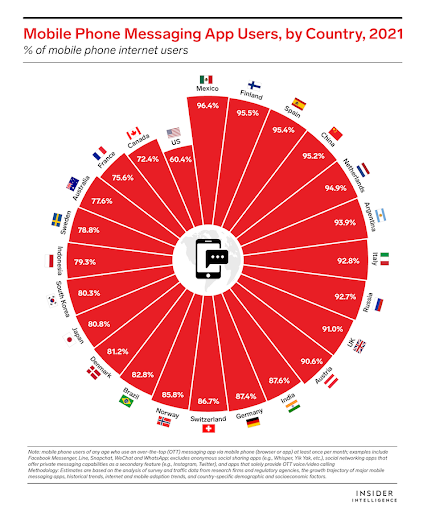
- Tinder announced it’s rolling out video profiles to more markets across Europe, Asia and Latin America. The feature was first introduced to a handful of countries earlier this year, allowing users to express themselves using video instead of just photos.
Image Credits: Tinder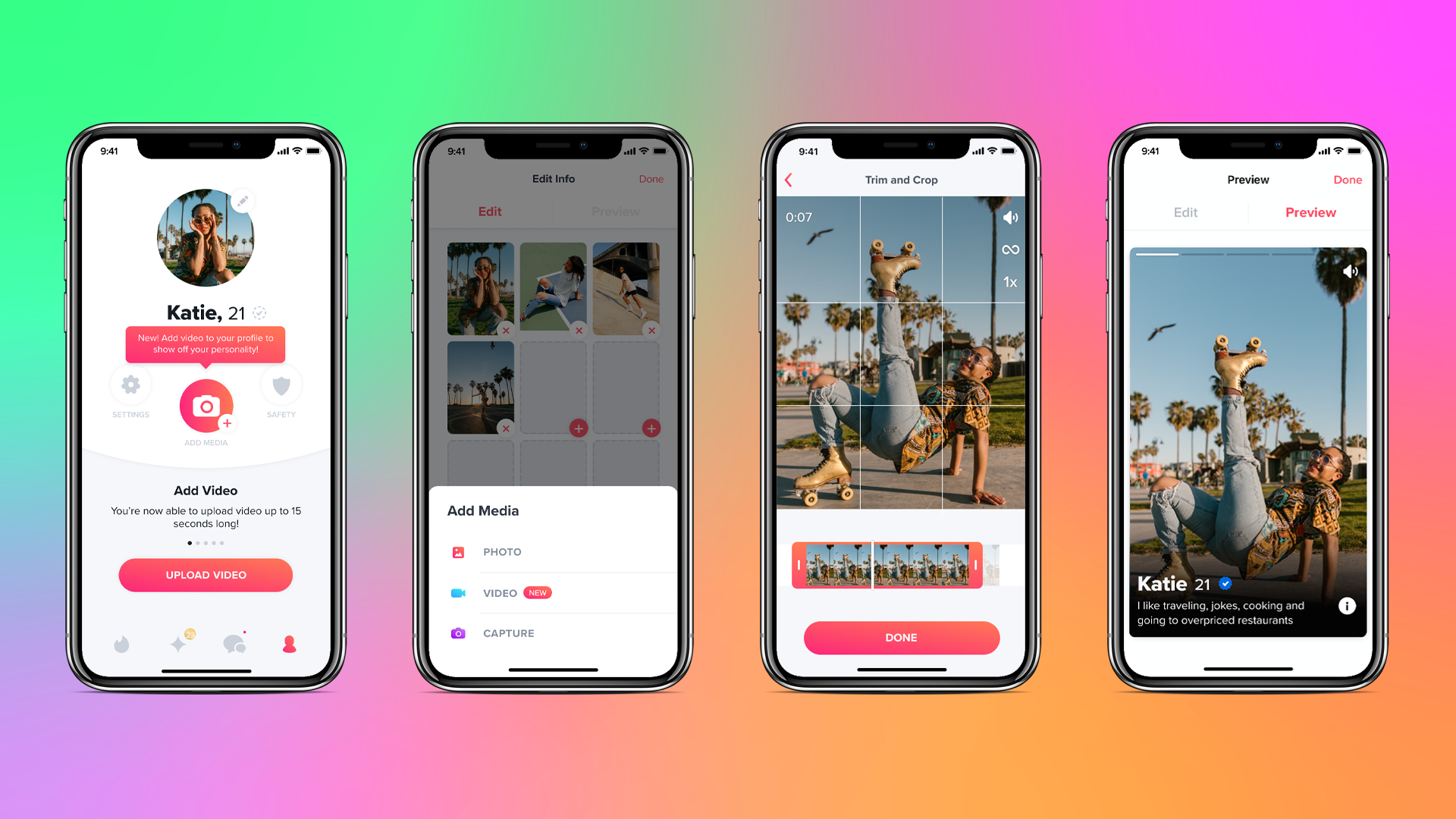
- Jeffrey Katzenberg’s failed streaming app Quibi settled its lawsuit with interactive video firm Eko, which alleged Quibi had infringed on its patents. Both parties have agreed to dismiss their legal claims, and QBI Holdings LLC, which holds the remaining Quibi assets, will transfer the intellectual property and technology for its “Turnstyle” mobile-video viewing feature to Eko.
- Clubhouse hired a head of News from NPR, Nina Gregory, to help it build out publisher relationships. Gregory led NPR’s Arts Desk for the last seven years.
- Apple announced new streaming partners for its upcoming iOS 15 SharePlay feature that allows for co-watching content through FaceTime. At WWDC, Apple said the feature would work with video apps Apple TV+, Disney+, HBO Max+, ESPN+ Paramount+, Pluto TV, NBA App, Twitch and TikTok. This week Apple said it was adding STARZ, BET+, TV Everywhere Apps from ViacomCBS (MTV, Paramount Network, & Comedy Comedy Central), and Chinese streaming service Youku. On the music side, it’s adding Spotify, TuneIn and SoundCloud, which join Apple Music.
- Apple’s Shazam app announced it has been used in the iOS Control Center over 1 billion times. The company previously noted it had passed one billion songs being recognized every month in June 2021. Both metrics paint a picture of the massive traction Apple’s first-party apps can gain based on their platform advantage.
- Celeb-to-fan connections app Cameo adds a new feature, Cameo Calls, that aims to digitize the fan “meet-and-greet” experience. At launch, fans can now connect with over 500 celebs for one-on-one, face-to-face calls by buying a ticket from their phone. The talent sets the pricing, which averages up to $31 minutes per call.
Gaming
Image Credits: Sensor Tower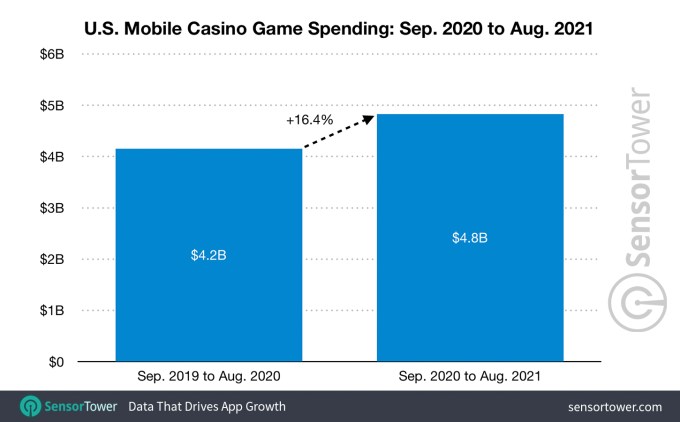
- U.S. mobile casino game spending grew by 16.4% to $4.8 billion during the last 12 months, according to a new Sensor Tower report. The No. 1 title from September 1, 2020 to August 31, 2021 was Coin Master from Moon Active, which generated $650.5 million. This was followed by Bingo Blitz from Playtika, then Slotomania from Playtika.
- Zynga announced ReVamp, the first “social deception” gaming title on Snapchat. The vampire-themed, multiplayer game is a spin on “Among Us,” as players work to unveil the imposter. The game takes place inside an old mansion where players have to complete renovation tasks, while the vampire players must avoid suspicion.
- Google’s internal R&D division is working on a newsletters project called Museletter that allows for subscription-based access to Google Drive content, like spreadsheets, docs and slides.
Image Credits: Google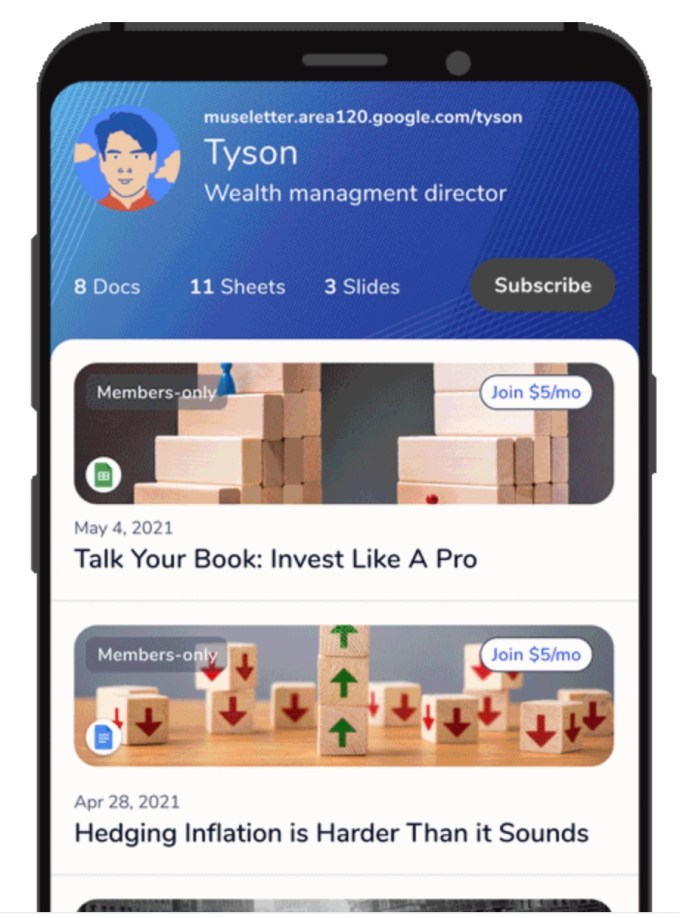
- The FTC warned health apps, like those tracking fitness or menstrual cycles, to notify consumers impacted by data breaches. The Commission voted 3-2 to clarify that health apps were included in the agency’s 2009 Health Breach Notification Rule, which required vendors to notify customers of data breaches.
- Downloads of top Travel apps in the U.S. reached 61.4 million on Apple’s App Store and 23.8 million on Google Play in Q2 2021, according to a new report by Sensor Tower. This represented the highest number of quarterly downloads since the outbreak of COVID-19.
Image Credits: Sensor Tower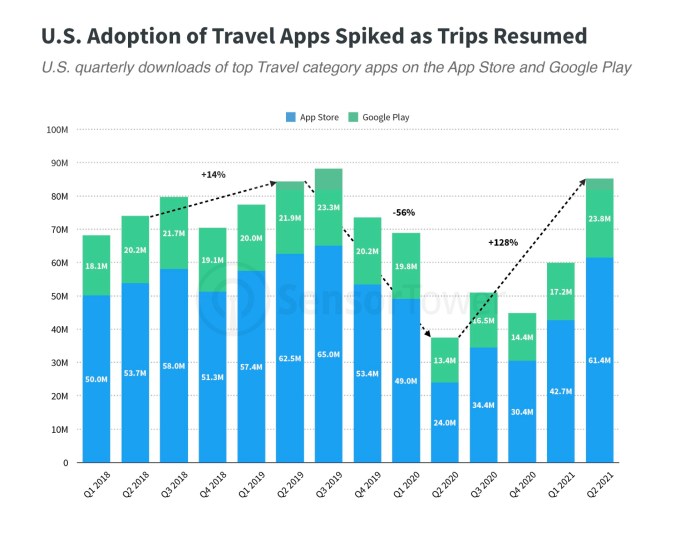
- Russia was considering fining Google and Apple over their hosting of a tactical voting app from opposition leader Alexei Navalny, but the “Smart Voting” app was removed by both stores. The companies had previously been warned to remove the app over claims of “election interference.” Apple’s upcoming iCloud Private Relay privacy feature also won’t be available in Russia, a support document recently noted in an update.
- Ireland’s Data Protection Commission (DPC) said it has opened two investigations into the video-sharing platform TikTok. The first covers how TikTok handles children’s data and whether it complies with Europe’s General Data Protection Regulation. The DPC will also examine TikTok’s transfers of personal data to China.
- South Korea fined Google $177 million for blocking Android customization by device makers, saying this was an abuse of its dominant position in the market.
- Chinese police are using a new fraud prevention app installed on more than 200 million mobile phones to identify and question people who have browsed foreign financial news sites, The FT reported. The police claimed they were working to combat the surge in fraud often carried out by foreign businesses controlled by Chinese and Taiwanese.
- Tencent and Alibaba said they will open up their apps to competitors, following a meeting with the Ministry of Industry and Information Technology (MIIT) last week. For eight years, the two companies have split China’s internet in two, The FT reported, replicating each other’s services and even blocking the posting of links in each other’s apps. That will now change in the weeks ahead.
Image Credits: Bryce Durbin / TechCrunch
- Apple patched a zero-day flaw that was impacting its top devices, including iPhone, iPad, Mac and Watches. Citizen Lab discovered the vulnerability and was credited with the find. The iMessage flaw was actively exploited by Pegasus, a spyware app developed by the Israeli company NSO Group, which gives government customers complete access to a target device, including data, photos, messages and location. The vulnerability was used to hack the iPhones belonging to at least one Bahraini activist.
- A new Android app, Nahoft, allows Iranians to speak freely by turning up to 1,000 characters of Farsi text into a jumble of random words. The text can then be sent to anyone over other messaging apps, but the recipient has to use Nahoft on their own device to read it.
- Apple reportedly threatened to remove Facebook from the App Store over human trafficking concerns following a 2019 BBC report about the matter, The WSJ reported.
- An untethered iOS 14.5.1 jailbreak was demoed working on the iPhone 12 Pro Max, in the days ahead of the iOS 15 release.
Image Credits: SmartNews
 Tokyo-based news aggregator SmartNews raised $230 million in Series F funding, valuing its business at $2 billion. The funding included U.S. investors Princeville Capital and Woodline Partners, as well as JIC Venture Growth Investments, Green Co-Invest Investment and Yamauchi-No.10 Family Office in Japan.
Tokyo-based news aggregator SmartNews raised $230 million in Series F funding, valuing its business at $2 billion. The funding included U.S. investors Princeville Capital and Woodline Partners, as well as JIC Venture Growth Investments, Green Co-Invest Investment and Yamauchi-No.10 Family Office in Japan.
 Venice, California-based Elodie Games raised $32.5 million for its cross-play, co-op games that run on PCs, consoles and mobile devices. The round was led by Galaxy Interactive and Andreessen Horowitz (a16z). The company, founded by mobile gaming vets Christina Norman and David Banks, two veterans of Riot Games, had previously raised $5 million in 2020.
Venice, California-based Elodie Games raised $32.5 million for its cross-play, co-op games that run on PCs, consoles and mobile devices. The round was led by Galaxy Interactive and Andreessen Horowitz (a16z). The company, founded by mobile gaming vets Christina Norman and David Banks, two veterans of Riot Games, had previously raised $5 million in 2020.
 Livestream shopping platform Whatnot, which focuses on collectibles like Pokémon cards and Funko Pops, confirmed the close of its $150 million Series C, valuing its business at $1.5 billion. Returning investors a16z and Y Combinator’s Continuity Fund joined new investor CapitalG (Google Capital) in the round. The Information previously reported the fundraise.
Livestream shopping platform Whatnot, which focuses on collectibles like Pokémon cards and Funko Pops, confirmed the close of its $150 million Series C, valuing its business at $1.5 billion. Returning investors a16z and Y Combinator’s Continuity Fund joined new investor CapitalG (Google Capital) in the round. The Information previously reported the fundraise.
 Bangalore-based Byju’s acquired California-headquartered coding platform Tynker for $200 million. The platform, which is available across platforms, including mobile, counts BBC Learning, Google, Microsoft, Mattel and NASA among its partners.
Bangalore-based Byju’s acquired California-headquartered coding platform Tynker for $200 million. The platform, which is available across platforms, including mobile, counts BBC Learning, Google, Microsoft, Mattel and NASA among its partners.
 San Francisco-based fantasy sports startup Sleeper is now valued at $400 million after raising $40 million in a round led by Andreessen Horowitz. The company has over 3 million users, most of whom are aged between 18 and 35. It has expanded into esports during the pandemic, after initially focusing on the NFL and the NBA.
San Francisco-based fantasy sports startup Sleeper is now valued at $400 million after raising $40 million in a round led by Andreessen Horowitz. The company has over 3 million users, most of whom are aged between 18 and 35. It has expanded into esports during the pandemic, after initially focusing on the NFL and the NBA.
 India-based networking app Apna, which helps blue-collar workers upskill and find jobs, raised a $100 million Series C led by Tiger Global. The round values the business at $1.1 billion and makes the company India’s youngest unicorn.
India-based networking app Apna, which helps blue-collar workers upskill and find jobs, raised a $100 million Series C led by Tiger Global. The round values the business at $1.1 billion and makes the company India’s youngest unicorn.
 Chat app Discord raised $500 million in a new round of funding led by Dragoneer Investment Group, valuing the business at $15 billion — more than double the valuation it was given at its last round of funding in 2020. The platform, which is particularly popular with gamers, has over 150 million monthly active users.
Chat app Discord raised $500 million in a new round of funding led by Dragoneer Investment Group, valuing the business at $15 billion — more than double the valuation it was given at its last round of funding in 2020. The platform, which is particularly popular with gamers, has over 150 million monthly active users.
 India’s Mobile Premier League (MPL) raised $150 million in a round of funding led by Legatum Capital, valuing its business at $2.3 billion. The three-year-old company connects game publishers with players on its app platform, allowing users to access a range of free gaming titles.
India’s Mobile Premier League (MPL) raised $150 million in a round of funding led by Legatum Capital, valuing its business at $2.3 billion. The three-year-old company connects game publishers with players on its app platform, allowing users to access a range of free gaming titles.
 Streetwear resale platform Grailed raised $60 million in Series B funding in a round led by competitor Goat Group, which also included Gucci CEO Marco Bizzarri, Groupe Artémis, Thrive Capital and Index Ventures. The company had 7 million users and 3 million listings at the time of the deal, but only 20% of users are female.
Streetwear resale platform Grailed raised $60 million in Series B funding in a round led by competitor Goat Group, which also included Gucci CEO Marco Bizzarri, Groupe Artémis, Thrive Capital and Index Ventures. The company had 7 million users and 3 million listings at the time of the deal, but only 20% of users are female.
 Indonesian investment app for retailer investors Pluang announced $55 million in new funding led by Square Peg, with participation from SIG, UOB Venture Management, Go-Ventures and Openspace Ventures. The app has 3 million users.
Indonesian investment app for retailer investors Pluang announced $55 million in new funding led by Square Peg, with participation from SIG, UOB Venture Management, Go-Ventures and Openspace Ventures. The app has 3 million users.
 Indian investment app Groww is in advanced talks to raise $250 million in new funding in a round that would value the business at $3 billion. Deal terms may still change. Tiger Global, Coatue and TCV have held conversations to lead or co-lead the round. The app is on track for around $35 million in ARR.
Indian investment app Groww is in advanced talks to raise $250 million in new funding in a round that would value the business at $3 billion. Deal terms may still change. Tiger Global, Coatue and TCV have held conversations to lead or co-lead the round. The app is on track for around $35 million in ARR.
Image Credits: OpeaSea on App Store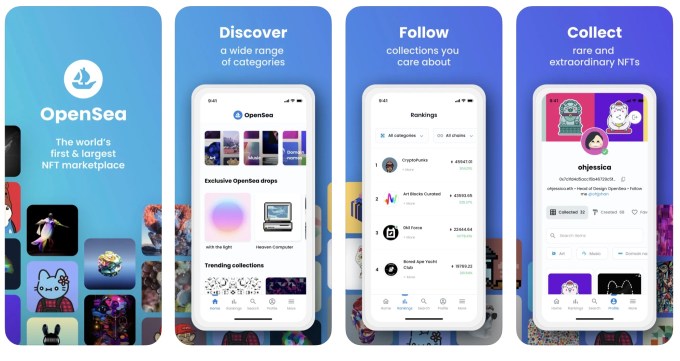
Amid an insider trading controversy, in which OpenSea’s Chief Product Officer Nate Chastain was caught buying NFT artwork shortly before they hit the site’s front page, then fired, the NFT marketplace company launched its first mobile app. The app, which is available as of Thursday on both the iOS App Store and Google Play, certainly arrives at a questionable time — why not wait for the dust to settle on the scandal, before moving forward with a mobile experience, sans CPO?
In any event, the new app allows users to connect their current profile, then search, filter, discover and save favorite NFTs, as well as view collections and item stats. The app will also link to blog posts about OpenSea developments and the NFT ecosystem as a whole. And it will link to exclusive releases. What you can’t do with OpenSea’s app, at least not yet, is actually purchase NFTs.
Castlevania: Grimoire of SoulsImage Credits: Konami
The latest reboot of the classic title is an Apple Arcade exclusive. Launched on Friday, September 17, Castlevania: Grimoire of Souls offers a new take on the popular side-scrolling action game — but one that’s free from in-app purchases or ads. The game features character designs and music from series creators Ayami Kojima and Michiru Yamane, and will see players embark on a new adventure where they “hack, slash, whip and blast their way through Dracula’s army using a variety of attacks, weapons, and unique character moves.” Characters available to play include Alucard, Simon Belmont, Charlotte, Shanoa and Maria, with more to come. An Apple Arcade subscription is $4.99 per month or can be purchased with an Apple One subscription plan.















